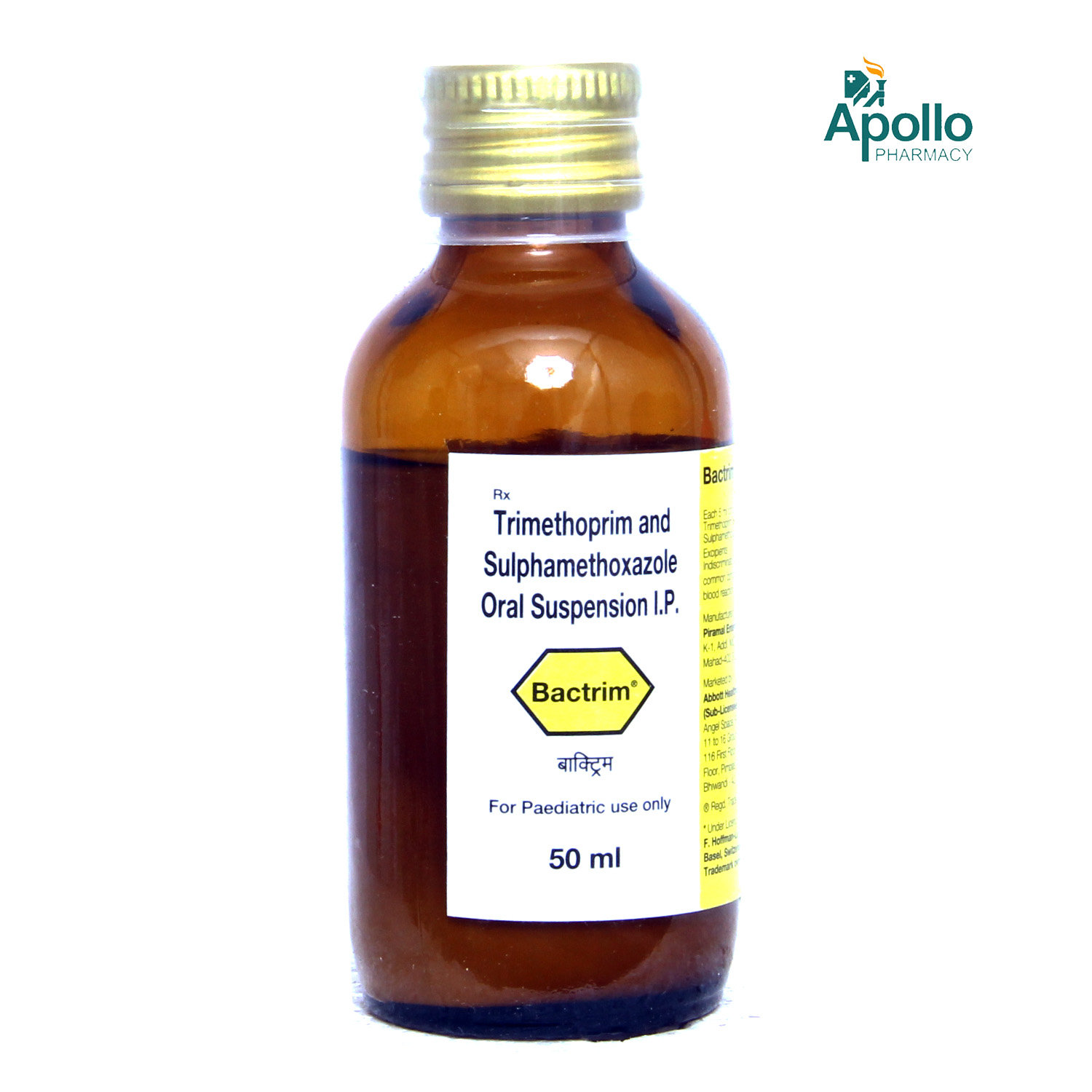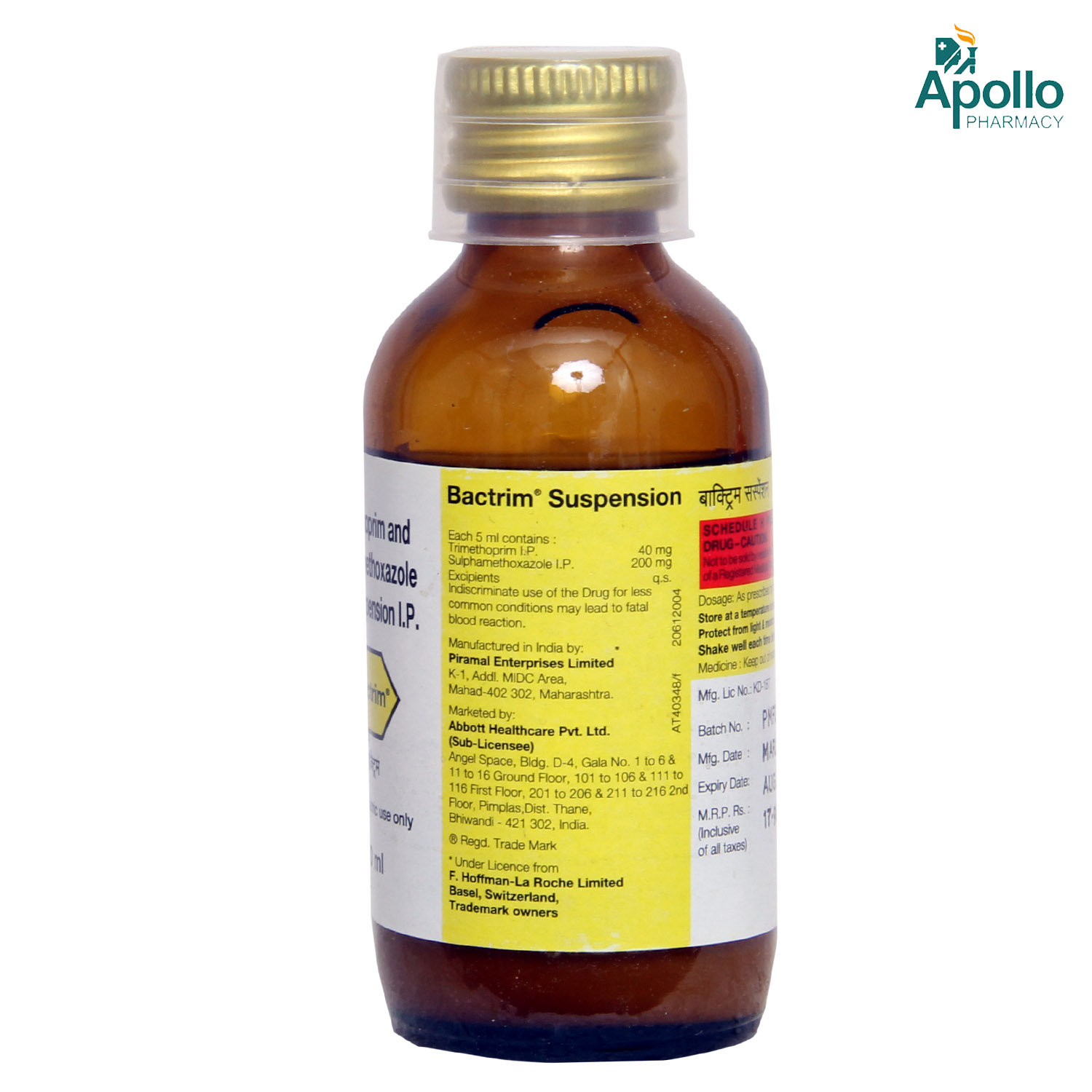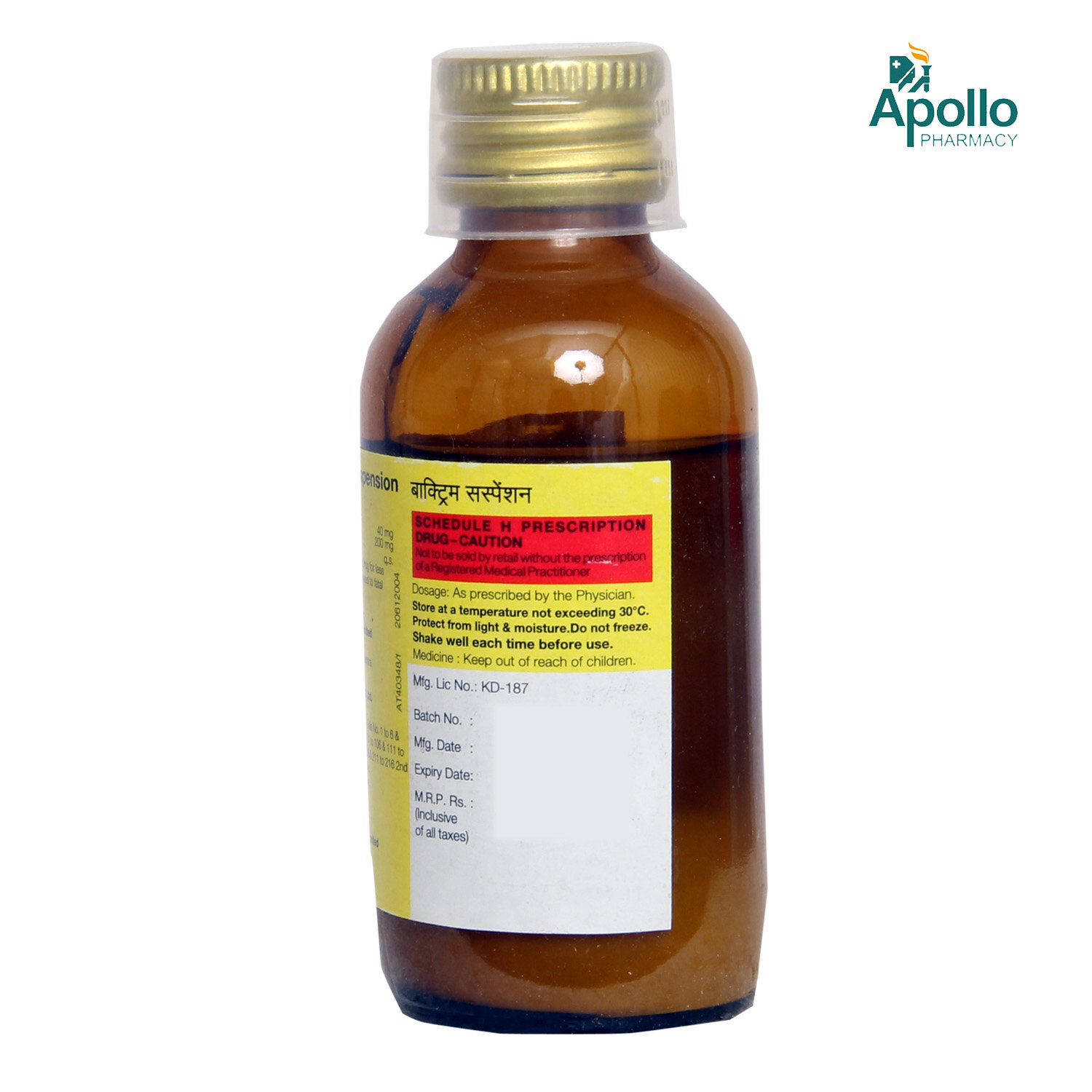Bactrim Suspension 50 ml
Selected Pack Size:50 ml
50 ml ₹16.7
(₹0.33 / 1 ml)
In Stock
30 ml ₹17.55
(₹0.59 / 1 ml)
Out of stock
MRP ₹18.5
(Inclusive of all Taxes)
₹2.8 Cashback (15%)
Know Your Delivery Time
Provide Delivery Location

Secure Payment

India's Most Trusted Pharmacy

Genuine Products
Composition :
Manufacturer/Marketer :
Consume Type :
Return Policy :
Expires on or after :
About Bactrim Suspension
Bactrim Suspension belongs to the group of medicines called antibiotics used to treat and prevent lung infections caused by a bacteria called Pneumocystis jirovecii, infections caused by a bacteria called Toxoplasma, urinary tract infections (water infections), respiratory tract infections such as bronchitis, ear infections such as otitis media. Bacterial infections are a condition or illness caused by bacterial growth inside or on the body. These harmful bacteria produce chemicals known as toxins, which can damage tissue and make you sick.
Bactrim Suspension contains Trimethoprim (folic acid inhibitors) and Sulfamethoxazole (sulfonamides). Trimethoprim prevents the formation of tetrahydrofolic acid, and sulfamethoxazole stops the bacteria from making dihydrofolic acid. Tetrahydrofolic acid and dihydrofolic acid are essential for forming proteins and nucleic acids, which are necessary for the survival of bacteria. By inhibiting these, Bactrim Suspension kills the bacteria and stops their growth. Thereby, it helps to treat bacterial infections.
Use Bactrim Suspension as prescribed by your paediatrician. The dose and duration of Bactrim Suspension can vary depending on the condition and the severity of the infection. In some cases, Bactrim Suspension may cause side effects such as headache, diarrhoea, skin rashes, nausea, vomiting, heart problems, fever, convulsions or seizures, blood or cloudiness in urine, hallucinations, and mouth ulcers. Most of these side effects of Bactrim Suspension do not require medical attention and gradually resolve over time. However, if the side effects persist or you notice any unusual symptoms developing in the child, inform your doctor immediately.
Inform your doctor about the complete medical history of your child. Do not use any other medications or supplements while using Bactrim Suspension unless recommended by the doctor.
Uses of Bactrim Suspension
Bactrim Suspension is used in the treatment of Bacterial infections. The detailed uses of Bactrim Suspension are as follows:
- Urinary Tract Infections (UTIs): Bactrim Suspension is commonly prescribed for bladder (cystitis) and kidney (pyelonephritis) infections. It works by inhibiting bacterial growth, helping relieve symptoms such as burning during urination, frequent urge to urinate, lower abdominal pain, and fever. It is especially useful in paediatric UTIs caused by E. coli and other susceptible organisms.
- Respiratory Tract Infections: Bactrim Suspension is effective in treating bronchitis, pneumonia, and sinusitis, particularly when caused by bacteria like Haemophilus influenza or Streptococcus pneumoniae. It helps reduce cough, chest congestion, difficulty breathing, and fever, and is often used when first-line antibiotics are not suitable.
- Ear Infections (Otitis Media): In children, Bactrim Suspension is used to manage middle ear infections, which can cause ear pain, irritability, hearing difficulty, and fever. It helps clear the infection and prevent complications like fluid buildup or hearing loss.
- Gastrointestinal Infections: Bactrim Suspension is used to treat traveller’s diarrhoea, shigellosis, and other bacterial GI infections. These conditions often present with watery or bloody diarrhoea, abdominal cramps, nausea, and dehydration. Bactrim Suspension helps eliminate the causative bacteria and shortens the duration of illness.

Have a query?
Directions for Use
- Bactrim Suspension can be administered with or without food as directed by the doctor.
- Follow your doctor’s instructions on the dosage and timing of this medication to ensure safety.
- Administer the prescribed dose to the child using the measuring cup/dosing syringe.
- Shake well before use.
Medicinal Benefits
Bactrim Suspension belongs to the group of medicines called ‘antibiotics’ used to treat various bacterial infections of the urinary tract, respiratory tract (bronchitis), ear (otitis media), lungs (pneumonia), skin, brain, and toxoplasmosis (infection caused by a bacteria called toxoplasma). Bactrim Suspension contains Trimethoprim (folic acid inhibitors) and Sulfamethoxazole (sulfonamides). Trimethoprim prevents the formation of tetrahydrofolic acid, and sulfamethoxazole stops the bacteria from making dihydrofolic acid. Tetrahydrofolic acid and dihydrofolic acid are essential for the formation of proteins and nucleic acids, which are necessary for the survival of bacteria. By inhibiting these, Bactrim Suspension kills the bacteria and stops their growth. Thereby, it helps to treat bacterial infections.
How Bactrim Suspension Works
Storage
- Inform your doctor about the nausea and discuss possible alternatives to the medication or adjustments to the dosage.
- Divide your daily food intake into smaller, more frequent meals to reduce nausea.
- Opt for bland, easily digestible foods like crackers, toast, plain rice, bananas, and applesauce.
- Avoid certain foods that can trigger nausea, such as fatty, greasy, spicy, and smelly foods.
- Drink plenty of fluids, such as water, clear broth, or electrolyte-rich beverages like coconut water or sports drinks.
- Use ginger (tea, ale, or candies) to help relieve nausea.
- Get adequate rest and also avoid strenuous activities that can worsen nausea.
- Talk to your doctor about taking anti-nausea medication if your nausea is severe.
- Record when your nausea occurs, what triggers it, and what provides relief to help you identify patterns and manage your symptoms more effectively.
- Preventing Vomiting (Before it Happens)
- Take medication exactly as prescribed by your doctor. This can help minimize side effects, including vomiting.
- Having a small meal before taking your medication can help reduce nausea and vomiting.
- Talk to your doctor about taking anti-nausea medication along with your prescribed medication.
- Managing Vomiting (If it Happens)
- Try taking ginger in the form of tea, ale, or candy to help alleviate nausea and vomiting.
- What to Do if Vomiting Persists
- Consult your doctor if vomiting continues or worsens, consult the doctor for guidance on adjusting your medication or additional treatment.
- Skin rash caused by allergies is due to irritants or allergens. Therefore, avoid contact with such irritants.
- Consult your doctor for proper medication and apply an anti-itch medication. Follow the schedule and use the medication whenever needed.
- Protect your skin from extreme heat and try to apply wet compresses.
- Soak in the cool bath, which gives a soothing impact to the affected area.
- Avoid trigger foods that can cause allergic reactions, such as nuts, shellfish, or dairy products.
- Keep a food diary to track potential food allergens.
- Include omega-3 rich foods like salmon and walnuts to reduce inflammation.
- Wear loose, comfortable clothing made from soft fabrics like cotton.
- Apply cool compresses or take cool baths to reduce itching.
- Use gentle soaps and avoid harsh skin products.
- Reduce stress through relaxation techniques like meditation or deep breathing.
What if I have taken an overdose of Bactrim Suspension
Drug Warnings
Before using Bactrim Suspension, let the doctor know about all your child's medical conditions, sensitivities, and all medications used. Do not use any other medications or supplements with Bactrim Suspension unless prescribed by the doctor.
Drug-Drug Interactions
Drug-Drug Interactions
Login/Sign Up
Taking Bactrim Suspension 50 ml with BCG vaccine can reduce the effectiveness of the BCG vaccine
How to manage the interaction:
Although there is an interaction between Bactrim Suspension 50 ml and BCG vaccine is not recommended, they can be taken together if prescribed by a doctor. Do not discontinue any medications without consulting a doctor.
The combined use of Bactrim Suspension 50 ml and clozapine may increase the risk or severity of toxicity.
How to manage the interaction:
There may be a possibility of interaction between Clozapine and Bactrim Suspension 50 ml, but it can be taken if prescribed by a doctor. If you're having any of these symptoms like fever, chills, sore throat, or muscle aches, it's important to contact your doctor right away. They may be able to recommend other options for you that won't cause any problems. Don't worry, there are solutions available to help you feel better. Do not discontinue any medications without first consulting your doctor.
Bactrim Suspension 50 ml may decrease the blood levels and effects of folic acid.
How to manage the interaction:
Although there is a possible interaction between Folic acid and Bactrim Suspension 50 ml, you can take these medicines together if prescribed by your doctor. Do not stop using any medications without consulting your doctor.
Co-administration of Bactrim Suspension 50 ml with procaine may increase the risk of blood disorders.
How to manage the interaction:
Taking Bactrim Suspension 50 ml with Procaine together can possibly result in an interaction, but it can be taken if your doctor has advised it. If you notice any of these symptoms like gray skin, feeling sick, headache, dizziness, tiredness, trouble breathing, fast heartbeat, or feeling anxious or confused, contact your doctor right away. Do not stop using any medications without talking to your doctor.
Enalapril combined with Bactrim Suspension 50 ml can cause hyperkalemia by elevating blood potassium levels. In severe cases, hyperkalemia can induce muscle paralysis, renal damage, and cardiac problems. The risk is increased if you are elderly, dehydrated, or have a history of renal or cardiovascular disease.
How to manage the interaction:
Although taking Enalapril together with Bactrim Suspension 50 ml may possibly result in an interaction, they can be taken together if prescribed by your doctor. However, contact your doctor immediately if you experience signs and symptoms of hyperkalemia, such as nausea, vomiting, confusion, numbness, tingling in hands and feet, and irregular heartbeat. It is advised to limit the intake of potassium-rich foods like tomatoes, bananas, mangoes, beans, and potassium-containing supplements. Do not discontinue any medication without consulting your doctor.
Using Bactrim Suspension 50 ml can cause higher levels of Quinidine in the blood which increases risk of side effects.
How to manage the interaction:
There may be a possibility of interaction between Bactrim Suspension 50 ml and Quinidine, but it can be taken if prescribed by a doctor. Do not stop using any medications without first talking to your doctor.
Using Bactrim Suspension 50 ml together with valsartan may increase potassium levels in the blood.
How to manage the interaction:
Although taking Bactrim Suspension 50 ml together with Valsartan may result in an interaction, they can be taken together if prescribed by a doctor. However, contact a doctor immediately if you experience nausea, vomiting, weakness, confusion, tingling of the hands and feet, feelings of heaviness in the legs, a weak pulse, or a slow or irregular heartbeat. Do not discontinue any medication without consulting a doctor.
Coadministration of Azilsartan medoxomil with Bactrim Suspension 50 ml may increase potassium levels in the blood.
How to manage the interaction:
Although there is an interaction between azilsartan medoxomil and Bactrim Suspension 50 ml, they can be taken together if prescribed by a doctor. However, consult a doctor if you experience vomiting, weakness, or tingling in your hands and feet. Do not discontinue any medications without a doctor's advice.
Taking Lisinopril with Bactrim Suspension 50 ml may increase potassium levels in the blood.
How to manage the interaction:
Although taking Bactrim Suspension 50 ml and Lisinopril together can evidently cause an interaction, it can be taken if your doctor has suggested it. However, consult the doctor immediately if you experience nausea, vomiting, weakness, confusion, tingling of the hands and feet, feelings of heaviness in the legs, a weak pulse, or a slow or irregular heartbeat. Do not stop using any medications without consulting doctor.
Taking Bactrim Suspension 50 ml with telmisartan may increase potassium levels in the blood.
How to manage the interaction:
Although there is an interaction between telmisartan and Bactrim Suspension 50 ml, they can be taken together if prescribed by a doctor. However, consult a doctor if you experience nausea, vomiting, weakness, confusion, tingling of the hands and feet, feelings of heaviness in the legs, and a weak pulse. Do not discontinue the medications without consulting a doctor.
Drug-Food Interactions
Drug-Food Interactions
Login/Sign Up
Diet & Lifestyle Advise
- It would be best to give probiotics after taking the full course of Bactrim Suspension to restore some healthy bacteria in the intestine that may have been killed. Taking probiotics after antibiotic treatment can reduce the risk of antibiotic-associated diarrhoea. Certain fermented foods like yoghurt, cheese, sauerkraut and kimchi can help restore the intestine's good bacteria.
- The BRAT diet (bananas, rice, applesauce, toast) can help with diarrhoea from antibiotics.
- Give plenty of water to the child. Staying hydrated is important, especially when you’re child sick.
- Eating a broad range of plant-based foods such as vegetables, fruits, nuts, seeds, pulses, and whole grains helps to build a healthy gut microbiome.
- Avoid feeding too many calcium-enriched foods and drinks because they may interfere with the functioning of Bactrim Suspension.
Habit Forming
Therapeutic Class
All Substitutes & Brand Comparisons
RX
Out of StockJolltrim Oral Suspension 50 ml
Jolly Healthcare
₹31
(₹0.55/ 1ml)
66% COSTLIER
Alcohol
Not applicable
It is intended for Children.
Pregnancy
Not applicable
It is intended for Children.
Breast Feeding
Not applicable
It is intended for Children.
Driving
Not applicable
It is intended for Children.
Liver
Caution
Inform your doctor if your child has liver problems. Your doctor will prescribe only if the benefits outweigh the risks.
Kidney
Caution
Inform your doctor if your child has kidney problems. Your doctor will prescribe only if the benefits outweigh the risks.
Children
Safe if prescribed
Bactrim Suspension can be given safely to children. Give this medicine to your child in the doses prescribed by the paediatrician.
Heart
Please consult your doctor before giving Bactrim Suspension to your child. Your doctor will prescribe Bactrim Suspension if the benefits outweigh the risks.
Geriatrics
Not applicable
Bactrim Suspension is for paediatric patients only.
FAQs
Bactrim Suspension is used to treat Bacterial infections.
Bactrim Suspension contains Trimethoprim (folic acid inhibitors) and Sulfamethoxazole (sulfonamides). Trimethoprim prevents the formation of tetrahydrofolic acid, and sulfamethoxazole stops the bacteria from making dihydrofolic acid. Tetrahydrofolic acid and dihydrofolic acid are essential for forming proteins and nucleic acids, which are necessary for the survival of bacteria. By inhibiting these, Bactrim Suspension kills the bacteria and stops their growth. Thus, helps to treat bacterial infections.
Bactrim Suspension causes thrush or candidiasis, a fungal infection occurring due to the overgrowth of yeast-like fungus in the mouth or throat. Hence, if you observe such symptoms in your child, seek medical help.
Bactrim Suspension may affect certain laboratory test results. Inform the person doing the tests that your child is taking Bactrim Suspension.
Bactrim Suspension may cause high levels of potassium in the blood, leading to abnormal heartbeats (palpitations). Regular potassium levels and heart rate monitoring is recommended while using Bactrim Suspension.
Country of origin
Manufacturer/Marketer address
Disclaimer
Author Details
We provide you with authentic, trustworthy and relevant information










